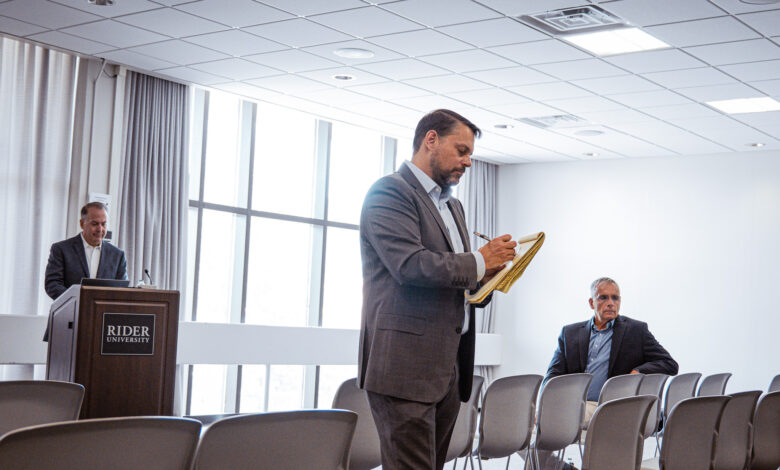
Presidential search committee sources student opinion
By Hannah Newman
FOLLOWING Rider President Gregory Dell’Omo’s retirement announcement on Sept. 10, the Board of Trustees started the search process for Rider’s next president.
A student listening session regarding the search for a new president was held on Oct. 4 so students have a voice in the selection process and can give input on what they are looking for in a president.
Student voices heard
Leading the search is Trustee Joseph McDougall ’93 with the help of Diversified Search Group, a search firm specializing in higher education executive leadership. The university has worked with the firm previously. The managing director of Diversified Search Group, Steve Leo, was present at the student session.
Sessions were also held for faculty and staff to ensure that every level of Rider’s community was heard in the search process, according to McDougall.
“We don’t have a lot of answers. This is the start of the process,” said McDougall. “Steve and I are going to take all that we hear and go back and convert what the community thinks we need.”
Leo stressed that knowing what the community thinks is vital to the search, as well as knowing what it takes to be Rider president, specifically.
“I’ve been doing this for almost 30 years and I’ve done a number of presidential searches, but one thing has been true in every place … what you are looking for is specific to Rider,” said Leo. “I’m going to be looking for people who are specific to what you’re looking for.”
The first question Leo asked students was why Rider was the place they chose to attend college and, more specifically, their motives for staying. He emphasized the topic as essential to pass onto candidates interested in the role.
Senior biology major and Vice President of Student Affairs for Rider’s Student Government Association Emma Cordero is on the women’s soccer team, which was the reason she enrolled and continued her education at Rider. She explained the biggest selling point for Rider is the community.
“It’s a small school. It’s a small class size. I walk around everyday and can say ‘hi’ to at least four to five people on my way to class,” said Cordero. “We would want a president that will contribute to the community, who is going to be around, who is going to know people by names.”
Senior political science major and SGA President Christina Natoli said, “There’s a very vibrant student life, and I think students leave much more successfully because of the opportunities that are here, between on-campus employment, extracurricular opportunities and even the way faculty are able to connect students with jobs.”
A call for change
In order to promote honesty, confidentiality within the session remained a priority, according to McDougall and Leo. Most students did not reveal their identities when speaking on their concerns, experiences and hopes for the future of Rider.
Many students brought up similar frustrations regarding the continuing financial deficits, limited accessibility and regular increases to Rider’s tuition. Parking tickets have also been a conflict among students since the university started charging for parking passes in fall 2023 at a rate of $125 per semester.
A huge factor for Rider’s next president, according to senior sociology major Jennie Mae Sprouse, would be the relationship between Rider’s administration and Westminster Choir College students.
Sprouse came in as a Westminster student, but later switched majors.
Sprouse said many promises were broken since WCC was moved to Rider’s Lawrenceville campus, including informing WCC students that they would receive a diploma with the choir college’s name on it. In reality, WCC students received the standard Rider diploma, according to Sprouse.
“Westminster is world renowned. We’ve won several awards, performed at Carnegie Hall over the years. We’ve worked with conductors like Leonard Berstein, who is extremely famous, and a lot of the prestige … faded away during this administration,” said Sprouse. “Nobody understands the rich culture that Westminster has had for all these years.”
The session was one of many to come for students, staff and faculty, according to both McDougall and Leo.


